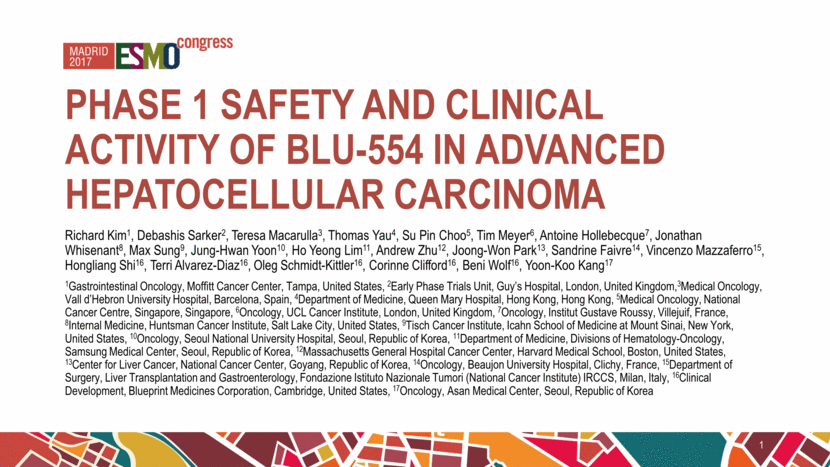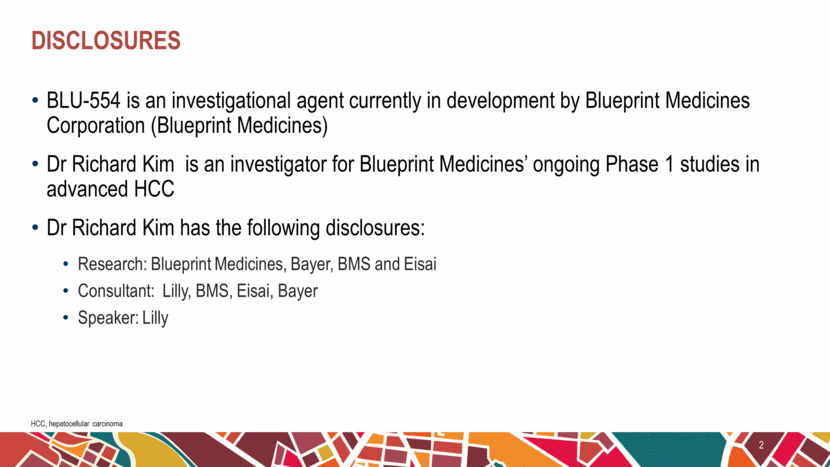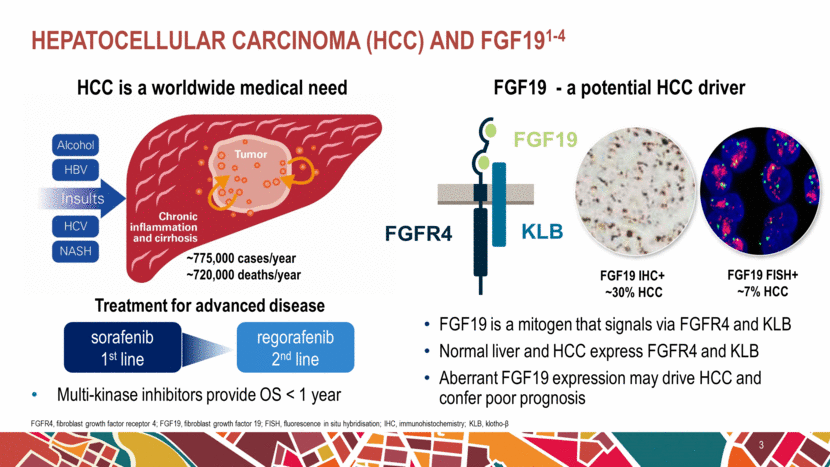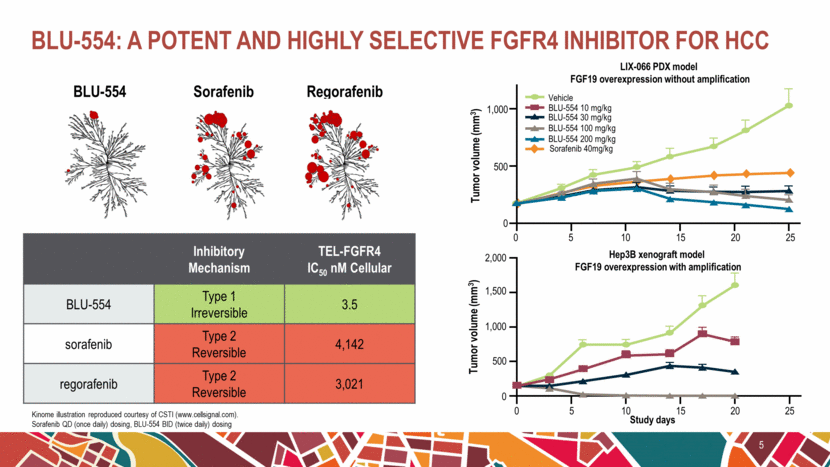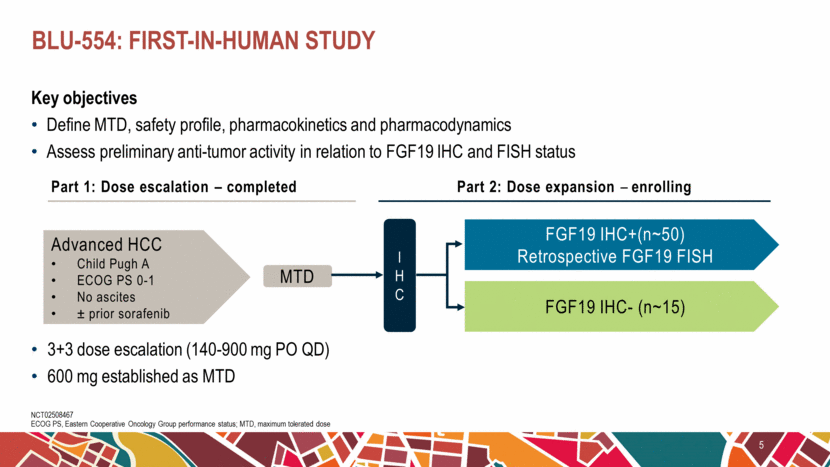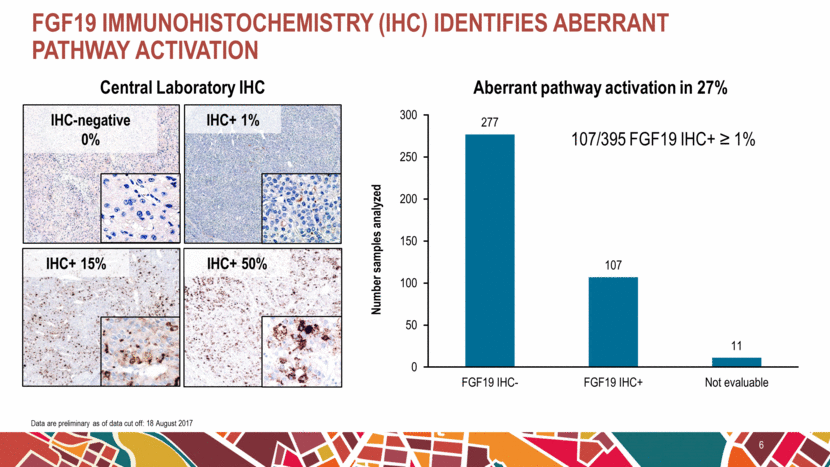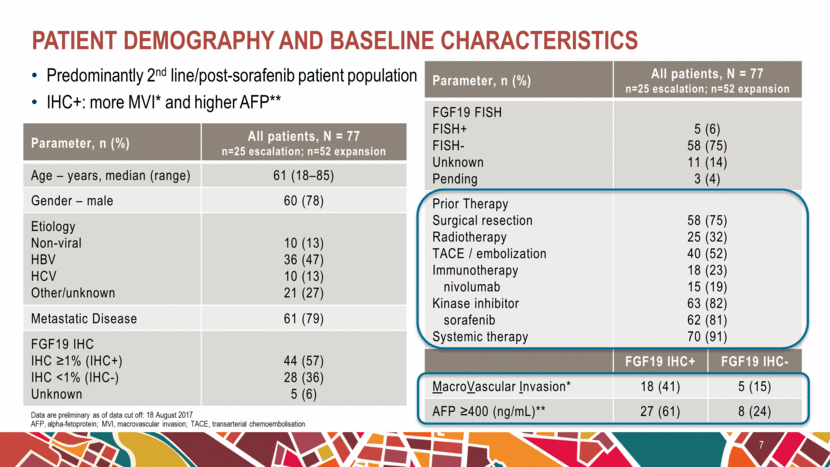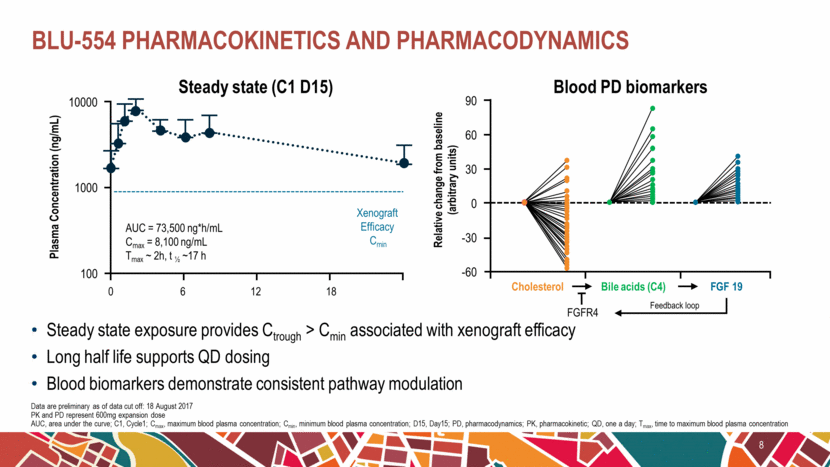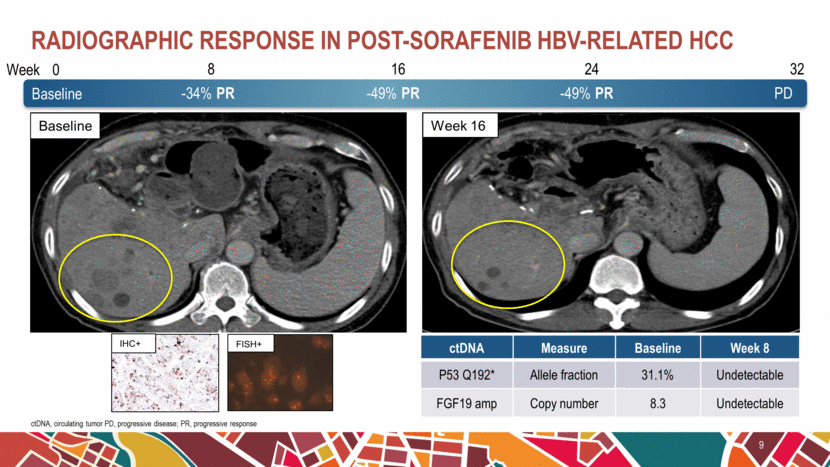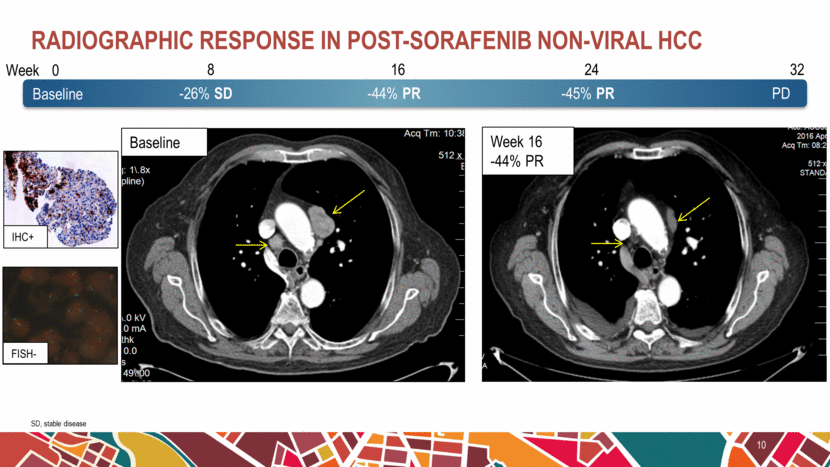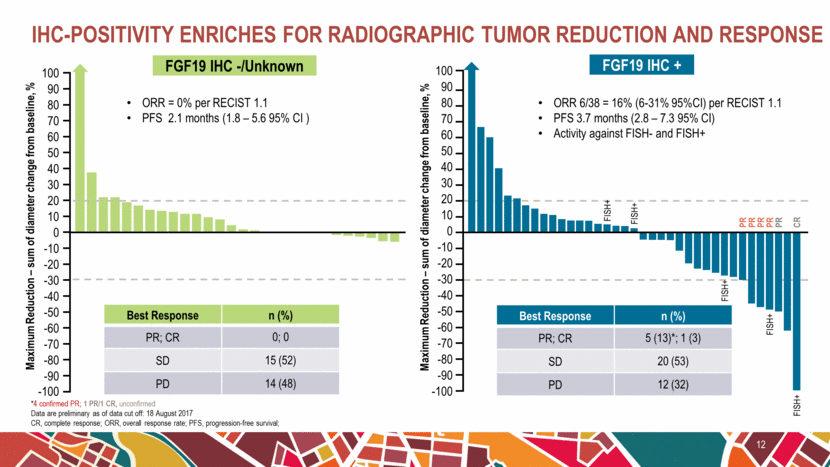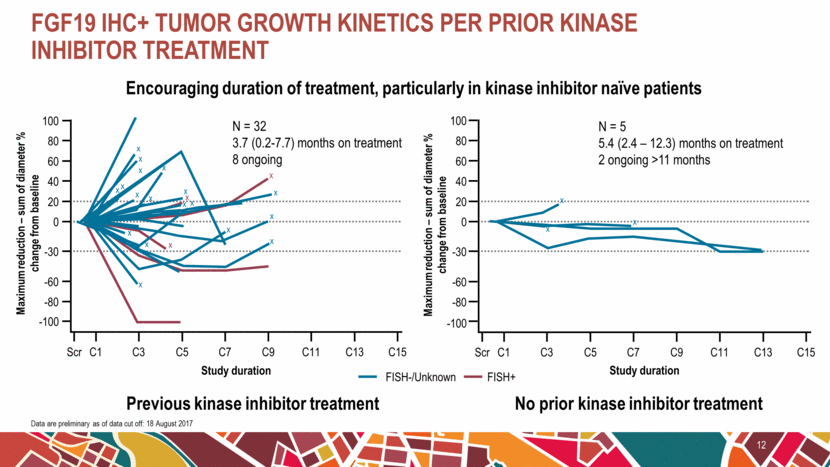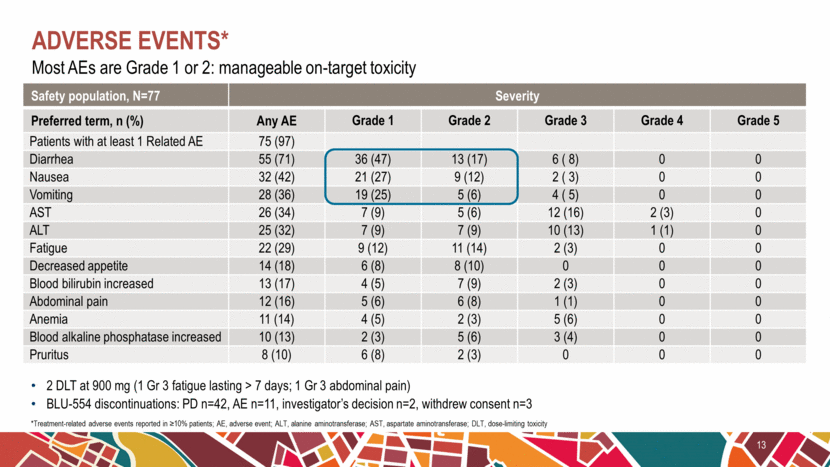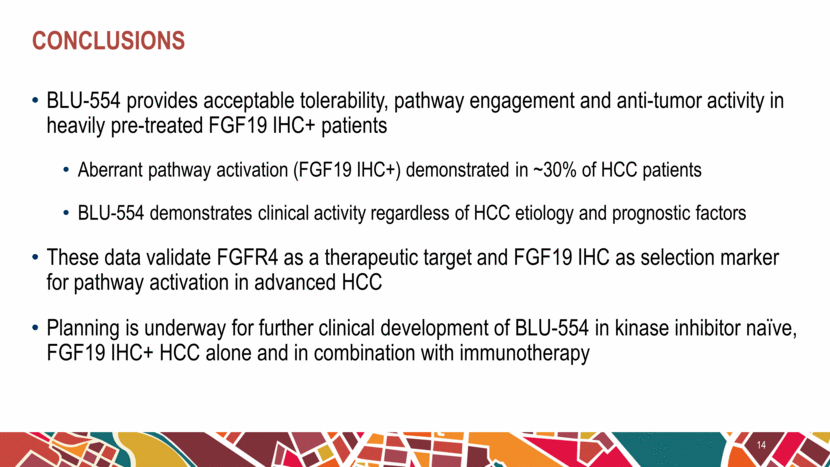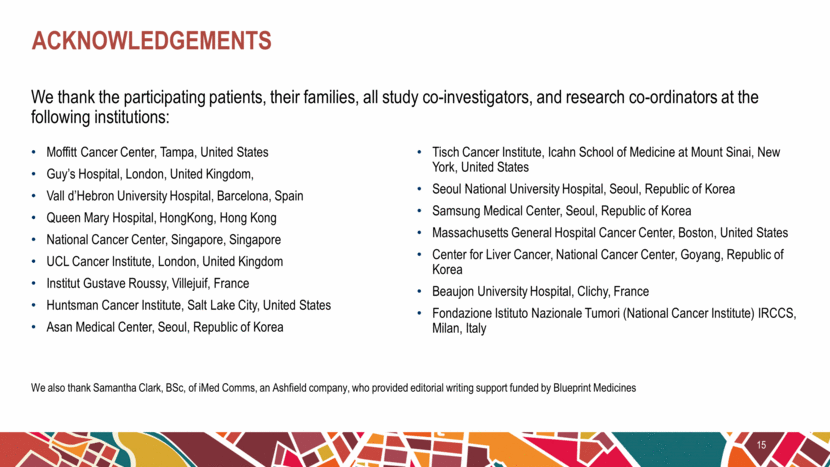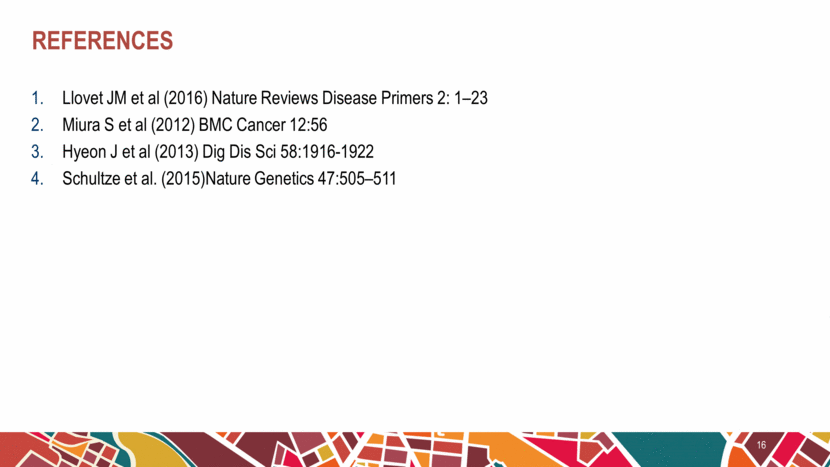Attached files
| file | filename |
|---|---|
| EX-99.3 - EX-99.3 - Blueprint Medicines Corp | bpmc-20170910ex9938591f1.htm |
| EX-99.1 - EX-99.1 - Blueprint Medicines Corp | bpmc-20170910ex991574749.htm |
| 8-K - 8-K - Blueprint Medicines Corp | bpmc-20170910x8k.htm |
Exhibit 99.2
|
|
Phase 1 safety and clinical activity of BLU-554 in advanced hepatocellular carcinoma Richard Kim1, Debashis Sarker2, Teresa Macarulla3, Thomas Yau4, Su Pin Choo5, Tim Meyer6, Antoine Hollebecque7, Jonathan Whisenant8, Max Sung9, Jung-Hwan Yoon10, Ho Yeong Lim11, Andrew Zhu12, Joong-Won Park13, Sandrine Faivre14, Vincenzo Mazzaferro15, Hongliang Shi16, Terri Alvarez-Diaz16, Oleg Schmidt-Kittler16, Corinne Clifford16, Beni Wolf16, Yoon-Koo Kang17 1Gastrointestinal Oncology, Moffitt Cancer Center, Tampa, United States, 2Early Phase Trials Unit, Guy’s Hospital, London, United Kingdom,3Medical Oncology, Vall d’Hebron University Hospital, Barcelona, Spain, 4Department of Medicine, Queen Mary Hospital, Hong Kong, Hong Kong, 5Medical Oncology, National Cancer Centre, Singapore, Singapore, 6Oncology, UCL Cancer Institute, London, United Kingdom, 7Oncology, Institut Gustave Roussy, Villejuif, France, 8Internal Medicine, Huntsman Cancer Institute, Salt Lake City, United States, 9Tisch Cancer Institute, Icahn School of Medicine at Mount Sinai, New York, United States, 10Oncology, Seoul National University Hospital, Seoul, Republic of Korea, 11Department of Medicine, Divisions of Hematology-Oncology, Samsung Medical Center, Seoul, Republic of Korea, 12Massachusetts General Hospital Cancer Center, Harvard Medical School, Boston, United States, 13Center for Liver Cancer, National Cancer Center, Goyang, Republic of Korea, 14Oncology, Beaujon University Hospital, Clichy, France, 15Department of Surgery, Liver Transplantation and Gastroenterology, Fondazione Istituto Nazionale Tumori (National Cancer Institute) IRCCS, Milan, Italy, 16Clinical Development, Blueprint Medicines Corporation, Cambridge, United States, 17Oncology, Asan Medical Center, Seoul, Republic of Korea 1 |
|
|
BLU-554 is an investigational agent currently in development by Blueprint Medicines Corporation (Blueprint Medicines) Dr Richard Kim is an investigator for Blueprint Medicines’ ongoing Phase 1 studies in advanced HCC Dr Richard Kim has the following disclosures: Research: Blueprint Medicines, Bayer, BMS and Eisai Consultant: Lilly, BMS, Eisai, Bayer Speaker: Lilly Disclosures 2 HCC, hepatocellular carcinoma |
|
|
Hepatocellular Carcinoma (HCC) and FGF191-4 3 FGFR4, fibroblast growth factor receptor 4; FGF19, fibroblast growth factor 19; FISH, fluorescence in situ hybridisation; IHC, immunohistochemistry; KLB, klotho-β Multi-kinase inhibitors provide OS < 1 year FGF19 - a potential HCC driver FGF19 is a mitogen that signals via FGFR4 and KLB Normal liver and HCC express FGFR4 and KLB Aberrant FGF19 expression may drive HCC and confer poor prognosis Treatment for advanced disease sorafenib 1st line regorafenib 2nd line ~775,000 cases/year ~720,000 deaths/year HCC is a worldwide medical need FGF19 IHC+ ~30% HCC FGF19 FISH+ ~7% HCC FGFR4 KLB FGF19 |
|
|
BLU-554: a potent and highly selective FGFR4 inhibitor for HCC 5 BLU-554 Sorafenib Regorafenib Inhibitory Mechanism TEL-FGFR4 IC50 nM Cellular BLU-554 Type 1 Irreversible 3.5 sorafenib Type 2 Reversible 4,142 regorafenib Type 2 Reversible 3,021 LIX-066 PDX model FGF19 overexpression without amplification 0 Tumor volume (mm3) Hep3B xenograft model FGF19 overexpression with amplification Study days 2,000 1,500 1,000 500 0 5 Tumor volume (mm3) 0 10 15 20 25 5 0 10 15 20 25 1,000 500 Vehicle BLU-554 30 mg/kg BLU-554 100 mg/kg BLU-554 200 mg/kg BLU-554 10 mg/kg Sorafenib 40mg/kg Kinome illustration reproduced courtesy of CSTI (www.cellsignal.com). Sorafenib QD (once daily) dosing, BLU-554 BID (twice daily) dosing |
|
|
Key objectives Define MTD, safety profile, pharmacokinetics and pharmacodynamics Assess preliminary anti-tumor activity in relation to FGF19 IHC and FISH status BLU-554: first-in-human study 5 NCT02508467 ECOG PS, Eastern Cooperative Oncology Group performance status; MTD, maximum tolerated dose Part 1: Dose escalation – completed Part 2: Dose expansion – enrolling Advanced HCC Child Pugh A ECOG PS 0-1 No ascites ± prior sorafenib MTD 3+3 dose escalation (140-900 mg PO QD) 600 mg established as MTD IHC FGF19 IHC- (n~15) FGF19 IHC+(n~50) Retrospective FGF19 FISH |
|
|
FGF19 immunohistochemistry (IHC) identifies aberrant pathway activation 6 107/395 FGF19 IHC+ ≥ 1% Aberrant pathway activation in 27% Central Laboratory IHC IHC-negative 0% IHC+ 1% IHC+ 15% IHC+ 50% Data are preliminary as of data cut off: 18 August 2017 277 107 11 0 50 100 150 200 250 300 FGF19 IHC- FGF19 IHC+ Not evaluable Number samples analyzed |
|
|
Predominantly 2nd line/post-sorafenib patient population IHC+: more MVI* and higher AFP** Patient demography and baseline characteristics 7 Data are preliminary as of data cut off: 18 August 2017 AFP, alpha-fetoprotein; MVI, macrovascular invasion; TACE, transarterial chemoembolisation Parameter, n (%) All patients, N = 77 n=25 escalation; n=52 expansion Age – years, median (range) 61 (18–85) Gender – male 60 (78) Etiology Non-viral HBV HCV Other/unknown 10 (13) 36 (47) 10 (13) 21 (27) Metastatic Disease 61 (79) FGF19 IHC IHC ≥1% (IHC+) IHC <1% (IHC-) Unknown 44 (57) 28 (36) 5 (6) Parameter, n (%) All patients, N = 77 n=25 escalation; n=52 expansion FGF19 FISH FISH+ FISH- Unknown Pending 5 (6) 58 (75) 11 (14) 3 (4) Prior Therapy Surgical resection Radiotherapy TACE / embolization Immunotherapy nivolumab Kinase inhibitor sorafenib Systemic therapy 58 (75) 25 (32) 40 (52) 18 (23) 15 (19) 63 (82) 62 (81) 70 (91) FGF19 IHC+ FGF19 IHC- MacroVascular Invasion* 18 (41) 5 (15) AFP ≥400 (ng/mL)** 27 (61) 8 (24) |
|
|
Steady state exposure provides Ctrough > Cmin associated with xenograft efficacy Long half life supports QD dosing Blood biomarkers demonstrate consistent pathway modulation BLU-554 pharmacokinetics and pharmacodynamics 8 Data are preliminary as of data cut off: 18 August 2017 PK and PD represent 600mg expansion dose AUC, area under the curve; C1, Cycle1; Cmax, maximum blood plasma concentration; Cmin, minimum blood plasma concentration; D15, Day15; PD, pharmacodynamics; PK, pharmacokinetic; QD, one a day; Tmax, time to maximum blood plasma concentration Steady state (C1 D15) Blood PD biomarkers Plasma Concentration (ng/mL) AUC = 73,500 ng*h/mL Cmax = 8,100 ng/mL Tmax ~ 2h, t ½ ~17 h 10000 1000 100 18 12 6 0 FGFR4 Relative change from baseline (arbitrary units) Cholesterol 90 60 30 0 -30 -60 Bile acids (C4) FGF 19 Feedback loop Xenograft Efficacy Cmin |
|
|
Radiographic response in post-sorafenib HBV-related HCC 9 ctDNA, circulating tumor PD, progressive disease; PR, progressive response 0 8 16 24 32 -34% PR -49% PR -49% PR PD Week Baseline Week 16 Baseline ctDNA Measure Baseline Week 8 P53 Q192* Allele fraction 31.1% Undetectable FGF19 amp Copy number 8.3 Undetectable IHC+ FISH+ |
|
|
Radiographic response in post-sorafenib non-viral HCC 10 SD, stable disease 0 8 16 24 32 -26% SD -44% PR -45% PR PD Week Baseline IHC+ Week 16 -44% PR Baseline FISH- |
|
|
IHC-positivity enriches for radiographic tumor reduction and response 12 *4 confirmed PR; 1 PR/1 CR, unconfirmed Data are preliminary as of data cut off: 18 August 2017 CR, complete response; ORR, overall response rate; PFS, progression-free survival; Best Response n (%) PR; CR 5 (13)*; 1 (3) SD 20 (53) PD 12 (32) Best Response n (%) PR; CR 0; 0 SD 15 (52) PD 14 (48) ORR 6/38 = 16% (6-31% 95%CI) per RECIST 1.1 PFS 3.7 months (2.8 – 7.3 95% CI) Activity against FISH- and FISH+ 100 90 80 70 60 50 40 30 20 10 0 -10 -20 -30 -40 -50 -60 -70 -80 -90 -100 Maximum Reduction – sum of diameter change from baseline, % ORR = 0% per RECIST 1.1 PFS 2.1 months (1.8 – 5.6 95% CI ) Maximum Reduction – sum of diameter change from baseline, % FISH+ FISH+ FISH+ FISH+ PR PR PR PR CR FISH+ PR 100 90 80 70 60 50 40 30 20 10 0 -10 -20 -30 -40 -50 -60 -70 -80 -90 -100 FGF19 IHC -/Unknown FGF19 IHC + |
|
|
FGF19 IHC+ tumor growth kinetics per prior kinase inhibitor treatment 12 Data are preliminary as of data cut off: 18 August 2017 Encouraging duration of treatment, particularly in kinase inhibitor naïve patients Previous kinase inhibitor treatment Maximum reduction – sum of diameter % change from baseline No prior kinase inhibitor treatment Maximum reduction – sum of diameter % change from baseline Study duration FISH-/Unknown FISH+ Study duration Scr C1 -100 100 80 60 40 20 0 -80 -60 -30 C3 C5 C7 C9 C11 C13 C15 x x x x x x x x x x x x x x x x x x x x x -100 Scr C1 100 80 60 40 20 0 -80 -60 -30 C3 C5 C7 C9 C11 C13 C15 x x x N = 5 5.4 (2.4 – 12.3) months on treatment 2 ongoing >11 months N = 32 3.7 (0.2-7.7) months on treatment 8 ongoing |
|
|
Most AEs are Grade 1 or 2: manageable on-target toxicity Adverse events* 13 *Treatment-related adverse events reported in ≥10% patients; AE, adverse event; ALT, alanine aminotransferase; AST, aspartate aminotransferase; DLT, dose-limiting toxicity 2 DLT at 900 mg (1 Gr 3 fatigue lasting > 7 days; 1 Gr 3 abdominal pain) BLU-554 discontinuations: PD n=42, AE n=11, investigator’s decision n=2, withdrew consent n=3 Safety population, N=77 Severity Preferred term, n (%) Any AE Grade 1 Grade 2 Grade 3 Grade 4 Grade 5 Patients with at least 1 Related AE 75 (97) Diarrhea 55 (71) 36 (47) 13 (17) 6 ( 8) 0 0 Nausea 32 (42) 21 (27) 9 (12) 2 ( 3) 0 0 Vomiting 28 (36) 19 (25) 5 (6) 4 ( 5) 0 0 AST 26 (34) 7 (9) 5 (6) 12 (16) 2 (3) 0 ALT 25 (32) 7 (9) 7 (9) 10 (13) 1 (1) 0 Fatigue 22 (29) 9 (12) 11 (14) 2 (3) 0 0 Decreased appetite 14 (18) 6 (8) 8 (10) 0 0 0 Blood bilirubin increased 13 (17) 4 (5) 7 (9) 2 (3) 0 0 Abdominal pain 12 (16) 5 (6) 6 (8) 1 (1) 0 0 Anemia 11 (14) 4 (5) 2 (3) 5 (6) 0 0 Blood alkaline phosphatase increased 10 (13) 2 (3) 5 (6) 3 (4) 0 0 Pruritus 8 (10) 6 (8) 2 (3) 0 0 0 |
|
|
BLU-554 provides acceptable tolerability, pathway engagement and anti-tumor activity in heavily pre-treated FGF19 IHC+ patients Aberrant pathway activation (FGF19 IHC+) demonstrated in ~30% of HCC patients BLU-554 demonstrates clinical activity regardless of HCC etiology and prognostic factors These data validate FGFR4 as a therapeutic target and FGF19 IHC as selection marker for pathway activation in advanced HCC Planning is underway for further clinical development of BLU-554 in kinase inhibitor naïve, FGF19 IHC+ HCC alone and in combination with immunotherapy Conclusions 14 |
|
|
We thank the participating patients, their families, all study co-investigators, and research co-ordinators at the following institutions: Acknowledgements 15 We also thank Samantha Clark, BSc, of iMed Comms, an Ashfield company, who provided editorial writing support funded by Blueprint Medicines Moffitt Cancer Center, Tampa, United States Guy’s Hospital, London, United Kingdom, Vall d’Hebron University Hospital, Barcelona, Spain Queen Mary Hospital, HongKong, Hong Kong National Cancer Center, Singapore, Singapore UCL Cancer Institute, London, United Kingdom Institut Gustave Roussy, Villejuif, France Huntsman Cancer Institute, Salt Lake City, United States Asan Medical Center, Seoul, Republic of Korea Tisch Cancer Institute, Icahn School of Medicine at Mount Sinai, New York, United States Seoul National University Hospital, Seoul, Republic of Korea Samsung Medical Center, Seoul, Republic of Korea Massachusetts General Hospital Cancer Center, Boston, United States Center for Liver Cancer, National Cancer Center, Goyang, Republic of Korea Beaujon University Hospital, Clichy, France Fondazione Istituto Nazionale Tumori (National Cancer Institute) IRCCS, Milan, Italy |
|
|
Llovet JM et al (2016) Nature Reviews Disease Primers 2: 1–23 Miura S et al (2012) BMC Cancer 12:56 Hyeon J et al (2013) Dig Dis Sci 58:1916-1922 Schultze et al. (2015)Nature Genetics 47:505–511 References 16 |

